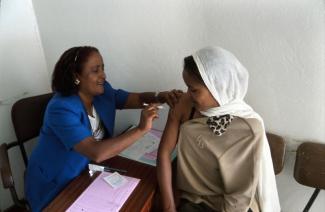Planned parenthood
Advice matters

For couples to be able to make an informed decision about contraception, they need good information. That starts with a clear and comprehensive understanding of how bodies function and information on the use, effects and risks of the different contraceptive methods. Good counselling helps people to make the right personal choices. Where these conditions are met, one can speak of genuine empowerment and personal autonomy.
For various reasons, only a limited range of contraceptive methods may be available in any given country. Where choices are limited, it is always worth taking a critical look at the focus of national policies and international programmes. What is their main objective? If it is to lower the birth rate, measures such as female sterilisation may be promoted – sometimes even by coercion. Under a national family planning programme in Peru, some 300,000 women and 22,000 men were forcibly sterilised between 1996 and 2000.
In India, contraception currently means sterilisation for three-quarters of women. For men, the sterilisation rate is just 2.3 %. While male sterilisation is normally a straightforward procedure, the equivalent surgery for women carries far greater risks. In 2014, for example, 15 women died in India after undergoing surgery at a mass sterilisation camp. Even earlier, India’s governmental family-planning programme had attracted criticism because of the high incidence of sterilisation. International organisations point out that women’s rights are often violated in this context, and that the procedures expose women to serious health risks.
Imbalanced availability
Sometimes, the options that are subsidised by international aid agencies such as the long-term contraceptive shot are widely available in a country, while others are not. Pharmaceutical companies, moreover, often donate drugs or reduce prices for a limited time in order to introduce expensive products to markets. All too often, this approach results in other contraceptive methods being crowded out. This kind of corporate marketing strategy often proves very costly for users in the long run.
A limited supply of contraceptives curbs couples’ freedom to choose the method of contraception that suits their needs best. There may be medical reasons for not using hormone-based contraceptives, for example, but if no alternatives are available, the couples concerned face the choice of either not using contraceptives at all or accepting health risks that are actually avoidable in principle.
Even where good counselling services and a wide range of contraceptives are available, however, their impact remains limited unless fundamental social problems are resolved. In this context, poverty reduction is high on the agenda. Research shows that family planning, obstetric care and even post-natal care often depend crucially on a woman’s socioeconomic status. This status needs to be strengthened, and women must get a greater say in social life.
At the same time, the underlying causes of gender-based inequality need to be tackled. In particular, girls’ and women’s right to sexual self-determination must get a boost, and practices such as early marriage, forced marriage and genital mutilation must be stopped.
Enshrining and implementing rights
Another crucial factor is the extent to which sexual and reproductive health and rights (SRHRs) are enshrined in national and international law. Unfortunately, the UN Agenda 2030 with the Sustainable Development Goals does not specifically refer to comprehensive sex education that deals with gender roles, gender identities and sexual diversity. Nor is there any mention of sexual rights. In recent years, moreover, G7 summit declarations have fallen behind earlier multilateral commitments as were made, for instance, at the World Conference on Women in Beijing in 1995, concerning the comprehensive implementation of SRHRs. More needs to be done.
The fact that 56 % of pregnancies in Latin America are unwanted is due not only to factors such as low availability of contraceptives and cultural barriers to contraception. The poor quality of sex education matters too. Good education must be comprehensive and cover all issues that relate to SRHRs. In Bangladesh, a survey of 12- to 19-year-old girls showed that ignorance of their rights was linked to being married early, not attending school or only getting a rather low level of education. Paternalism in families is still common in many countries, so women’s and girls’ knowledge of their right to sexual self-determination is particularly important.
The quality of counselling services is crucial for the implementation of SRHRs – and it is not only about contraceptives. The yardstick of a project’s success must therefore not be the number of contraceptives distributed. The quality of the advice given is just as important, and it can depend, for instance, on whether both partners are included in counselling, whether all methods of contraception are discussed and whether necessary medical examinations are conducted.
Hedwig Diekwisch is a nurse and sociologist and a member of the BUKO Pharma-Kampagne team.
hd@bukopharma.de






